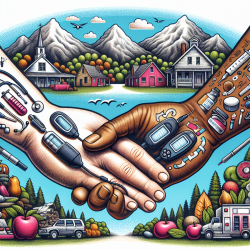Introduction
In the heart of southeastern Appalachian Ohio, healthcare providers face a formidable challenge: combating the high prevalence of diabetes in a region burdened by economic distress and a critical shortage of healthcare professionals. The research article "Diabetes in Appalachia: providers’ perspectives" sheds light on the barriers and facilitators in treating diabetes in this region, offering invaluable insights for practitioners seeking to enhance their skills and improve patient outcomes.
Understanding the Barriers
The study identifies four key themes that practitioners must consider:
- Diabetes Fatalism and Helplessness: Many patients in Appalachia view diabetes as an inevitable fate, influenced by family history and a lack of awareness about preventive measures. This fatalistic attitude poses a significant barrier to effective treatment.
- Comorbid Psychosocial Issues: High rates of depression, anxiety, and PTSD among patients complicate diabetes management. The shortage of mental health professionals exacerbates this issue, leaving many patients without the necessary support.
- Inter-connected Social Determinants: Factors such as limited access to healthcare, transportation, food insecurity, and financial instability create a complex web of challenges that hinder effective diabetes care.
- Providers’ Cultural Understanding: A deep understanding of Appalachian culture—characterized by kinship, loyalty, and community—is crucial. Trust-building and culturally attuned approaches are essential for successful patient-provider relationships.
Strategies for Improvement
To address these barriers, practitioners can implement several strategies:
- Enhance Cultural Competency: Training in cultural competency and humility can help providers better understand and respect the unique cultural context of their patients, fostering trust and improving communication.
- Utilize Community Health Workers (CHWs): CHWs can bridge the gap between providers and patients, offering culturally relevant support and education. Their presence in the community can enhance trust and engagement.
- Leverage Technology: Mobile health (mHealth) solutions can provide accessible and cost-effective diabetes management tools, especially in areas with limited healthcare resources.
- Collaborate with Local Resources: Building partnerships with local organizations and leveraging community resources can help address social determinants of health, such as transportation and food access.
Encouraging Further Research
While the study provides a comprehensive overview of the challenges and potential solutions, further research is needed to explore innovative approaches to diabetes care in Appalachia. Practitioners are encouraged to engage in ongoing research and collaboration to develop tailored interventions that address the unique needs of this population.
Conclusion
By embracing cultural competency, leveraging community resources, and exploring innovative solutions, practitioners can empower patients in Appalachia to overcome barriers and improve their diabetes management. The insights from this research serve as a catalyst for change, inspiring healthcare providers to transform challenges into opportunities for better health outcomes.
To read the original research paper, please follow this link: Diabetes in Appalachia: providers’ perspectives.










